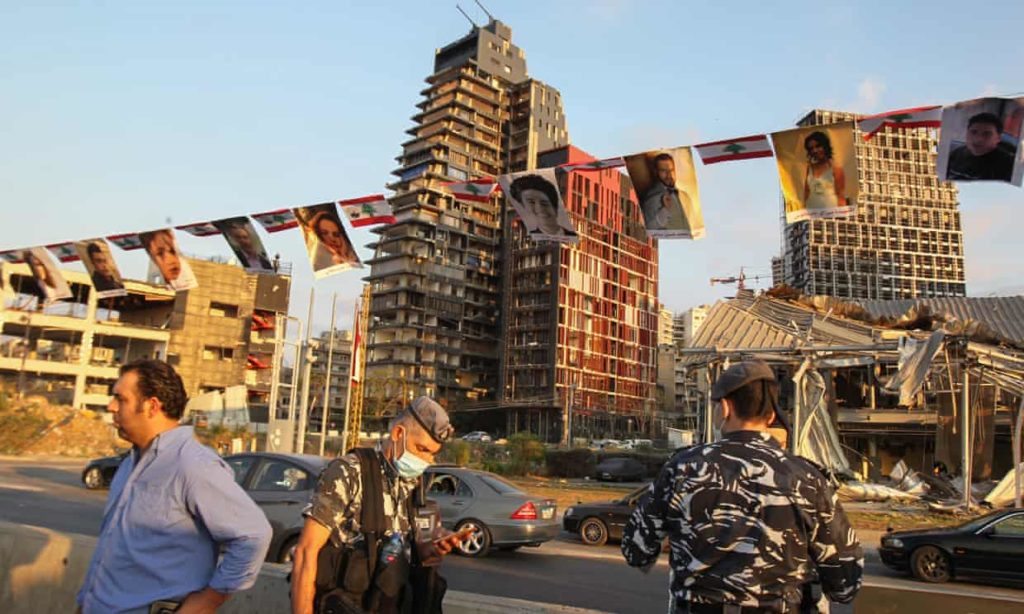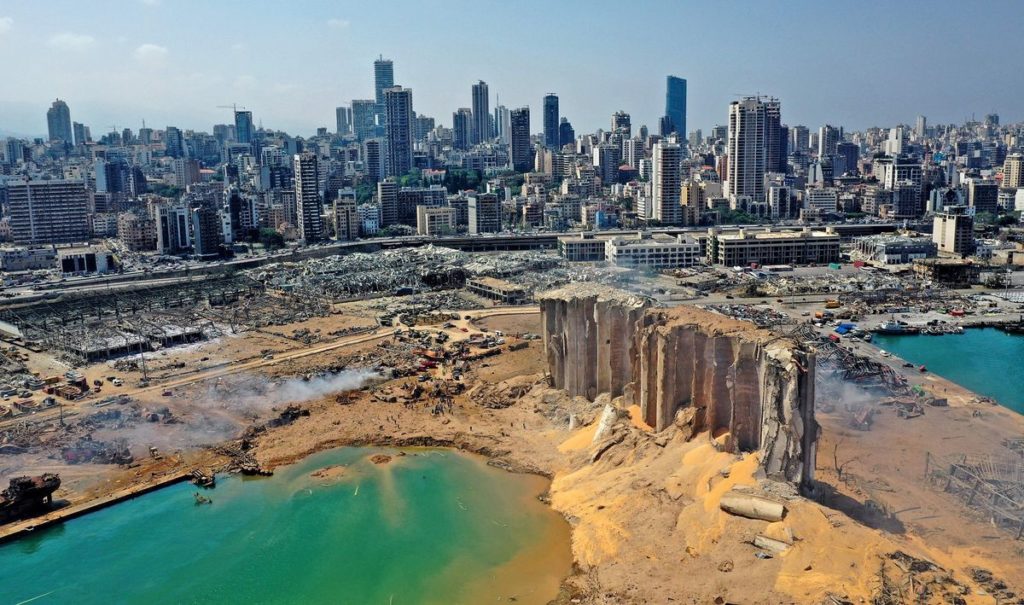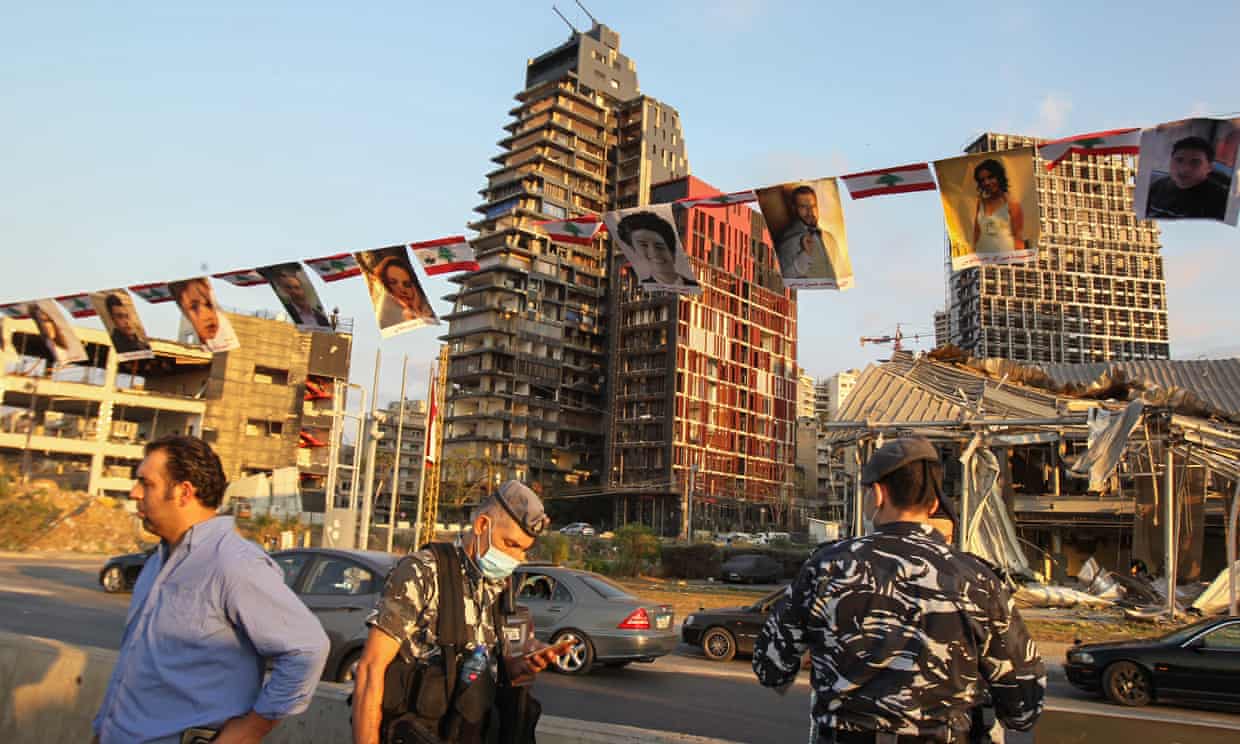After civil war, decades of corruption and then the blast that ripped through Beirut this summer, things could hardly get any worse. But they have

In early September, Mohammed Khaldoon sold a necklace his sister had given him and scrounged what he could from friends and family. He gave the sum total, $400, to a smuggler in his hometown of Tripoli, northern Lebanon, and took to sea, with 49 others in a rickety boat headed for Cyprus.
“He left without saying goodbye,” said Fatima Mohammed, who gave him the necklace. “The boat was small but the smuggler said it was only needed for a 200-metre trip and then they would move to a bigger one. He took all their food, water and bags and left them with nothing.”
The boat soon sank like dozens of other fateful voyages from neighbouring shores; Libya, Egypt, Syria and Turkey, from where thousands of desperate civilians had fled since 2015 before drowning in the Mediterranean. But Lebanon was supposed to be different; a safe haven, even in a region in freefall, where people had better options than fleeing to the oceans.
Now, with the country disintegrating more rapidly than anywhere in the world, large and rising numbers of Lebanese see the dream gone, their fight to etch out a future in what could have been their Camelot at a crushing end. Their new struggle is simply finding the quickest way to leave.

Nothing epitomised the disintegration of Lebanon into a failed state more than the explosion that ripped through Beirut’s port on 4 August. A stockpile of 2,750kg of ammonium nitrate inexplicably left in Beirut port for several years caught fire and exploded, killing 200 people, wounding thousands more and damaging at least 70,000 homes and buildings. The bulk terminal had become a microcosm of the state’s woes, with each political bloc taking a stake in what happened there and a cut of revenues. Its destruction drew the ire of an irate and exhausted people.
“Believe me, if I get a visa to any country in the world, I’d be out of here in a heartbeat,” said Hussein Termos, 36, from Marjeyoun in south Lebanon, now living in the Beirut suburb of Dahiyeh. “All I care about is being able to provide for everyday necessities: food, my water and my cigarettes.”
For many like Termos, facing an ongoing collapse in the value of the Lebanese currency, hyperinflation on the shelves, and mass unemployment, just scraping by is no longer an option. “The issue is there is no hope of a turnaround,’’ said Rabiah Khaireddine, a musician from the Druze community. “The weeks since the explosion have made that clear. Everyone I know wants to leave.”
The end of Lebanon’s civil war, which ran from 1975 to 1990, was just the first in a series of cataclysmic events in the country’s recent history. It was swiftly followed by an Israeli occupation and Syrian tutelage before political assassinations brought new waves of instability; the country’s former prime minister the most prominent among them. The death of Rafiq Hariri on Valentine’s Day 2005, fed the instability that followed, leading to Syria’s withdrawal. A senior member of Hezbollah, the political bloc-cum-powerful militia, was convicted by an international court this July, for planning the killing. There was a fresh war with Israel in 2006, before the uprising in Syria in 2011, which led to a wave of refugees entering Lebanon.
Elections and protest movements took place in Lebanon throughout this time, but last October numbers were bigger than ever and cross sectarian. Some thought the power of an energised street had finally exposed the brittleness of authority.
Rallies took place across the country in response to moves by leaders to impose taxes on things that Lebanese like – including a $5 levy on WhatsApp – to cover for years of corruption and mismanagement that was about to end in a default on bond payments, and a collapse of the financial system, run as a giant ponzi scheme.
The burst of civic spirit and cross-sectarian nationalism, from near the northern borders with Syria to the frontier with Israel, was supposed to herald an era in which Lebanon and its people could finally and collectively start to shape their destinies. But it soon gave way to something more typical of the post-civil war state and its rulers: paralysis and inertia.
By refusing demands for reforms, both economic and political, the leadership is accused by its people of consolidating the collapse. Bread queues have formed in recent weeks in the impoverished north, where Lebanese are seeking help with basic food needs for the first time since the civil war ended in 1990.
In the past year, prices of essentials have in some cases quadrupled. Government subsidies for flour, medicine and oil – paid for from what remains of the central bank’s dwindling reserves – are set to come to an end over the coming months. The result, for a country in which up to 70% of its people are approaching the poverty line, could be catastrophic.
The 12 months since those protests began has in many ways even eclipsed the darkest days of the sectarian conflict, which ruined the country and killed close to 115,000 people (the latest disaster came on Friday when a fuel tank exploded inside a Beirut building, killing four people and injuring several others). “At least we knew who the enemy was back then,” said Nabil Haddad, a fighter in the civil war, who now runs a Beirut bakery. “There was food on the table and money in the banks. As strange as it may seem, we could live. We knew it would end one day. Not this time.”
For many Lebanese, the worst part of the past year has not been witnessing the value of their currency collapse, their life savings imperilled by a broken banking sector, or by criminal negligence at the city’s port. “It’s been in knowing that there are solutions out there, but people are too selfish and too owned by outside interests to take them,” said Sara Idriss, a teacher from near Sidon in southern Lebanon. “I can’t believe this hasn’t led to widespread unrest even among the sects. And I can’t believe we’re not talking more openly about the interests that don’t want us to succeed on our own.”
In the Gemmayze district, adjacent to the port, Diah Suleiman was collecting paint to repair her flat ravaged by flying glass. “The French president came here to help,” she said. “He said he would give French money if we made it easy for him to justify to his taxpayers. All we had to do here was behave like a real country. That’s what was being asked, and they defied him.”
France has maintained an interest in Lebanon since the post-first world war mandate period that gave it a strong say in how the modern state was built. In the weeks after the explosion, which cast the country’s dysfunction into sharp global focus, Emmanuel Macron twice travelled to Lebanon, visiting the port and nearby neighbourhoods, where Lebanese leaders would dare not tread. The president implored them to look past narrow interests that have apportioned ministries according to sectarian quotas and use state funds to grease the wheels of patronage since the end of the war.
Reforming such a system was Macron’s central demand, as it had been of others who had seen the collapse coming and were willing to throw Lebanon a lifeline, despite their open impatience with its leaders. After the war ended in 1990, an accord negotiated in the Saudi Arabian city of Taif apportioned responsibilities along sectarian lines, in an attempt to share power. The Shia sect gained the parliamentary speaker’s position, the Maronites the presidency, and the Sunnis the prime minister post.
However, all three roles became central to an oligarchy that formed in the rubble of the country, dominating postwar reconstruction, and to regional interests who had taken a prominent stake in Lebanon since the early years of its modern republic and doubled down on their efforts after the ceasefire.
Development and rehabilitation of ravaged areas flourished, but profits were channelled to tycoons and their political patrons, barely filtering down to the working-class regions, which got by instead on remittances from family members who had emigrated to Canada, France, Australia, the US or the Gulf States. Outwardly, Lebanon appeared to prosper for 15 years. But flashpoints were steadily building – and Hezbollah, with the support of its patron, Iran, was gaining ground.
In 2016, when prime minister Saad Hariri – Rafiq’s son – made a deal to usher civil war-era general Michel Aoun into the presidency, Iran’s leading role in the country was consolidated. Ever since, its proxy, Hezbollah, has reinforced its already dominant role in the state affairs. As the country has withered under the past 12 months of crises, it has held a whip hand in how to respond. Hezbollah and its allies control 70 of the 128 seats in the country’s parliament.
“They were determined not to bow to the protest movement, no concessions of any meaningful kind,” said a regional diplomat familiar with Hezbollah’s thinking. “They were on a war footing. From then on, it became clear they didn’t care what happened to the state, as long as they emerged on top.”
Earlier this year, the US ramped up its “maximum pressure” campaign on Iran, believing in part that strangling the country’s economy would weaken Hezbollah in Lebanon and in Syria, where its backing for the president, Bashar al-Assad, has been central to his survival as leader.
As the US election has drawn near, hawks within Donald Trump’s administration have tried to direct the pressure on Iran towards Hezbollah, slapping sanctions on more of its leaders and businesses, and moving a Senate resolution that the government no longer be recognised as long as Hezbollah is part of the ruling coalition.
The party itself has said it will not be baited by Washington ahead of the inauguration of the next president in January. In the meantime, a senior official told the Observer that Hezbollah would not allow a new Lebanese government to be formed, after the last cabinet resigned following the port blast, before the inauguration unless on terms it found suitable.
On Thursday, Saad Hariri, who resigned amid last October’s protest movement, said he was willing to return to the post. Such a move would be a blow to demonstrators who have called unsuccessfully for an overhaul of the political class.
Macron is yet to respond to Hariri’s mooted revival – a move that so far fails to address the French president’s other insistence that aid be conditional on a regular rotation of ministers, particularly in vital portfolios such as finance. Macron made such a demand ahead of a failed attempt to coerce a government last month. “But it was blocked by Hezbollah,” said a senior European diplomat. “They did not want to give Macron a win, and they wanted the finance ministry for themselves. They needed to show who is boss.”
Afterwards, Macron said: “Hezbollah cannot operate at the same time as an army against Israel, a militia unleashed against civilians in Syria and a respectable political party in Lebanon. It must not believe that it is stronger than it is. It must show that it respects all Lebanese. These last days, it clearly demonstrated the opposite.”
Across Lebanon, concerns are increasing daily that what comes next will prove deeply divisive. However, talk of a new round of sectarian fighting is doused by community leaders who instead say people will retreat to core identities; the notion of a pluralistic power-sharing state continuing to dwindle.
Meanwhile, Termos said circumstances must soon change or more people would be forced to sea. “My monthly salary is 1 million lira,” he said. That’s less than $150 now. Tell me, how am I supposed to live on that? Politically speaking, I don’t care about any of them. I see people on a daily basis who cannot afford to eat any more; it’s a disaster, look at where they got us to and they still expect our support?”
Fatima Mohammed is yet to learn of her brother’s fate. However, in the weeks since he went missing she has gleaned more details. “They were lost at sea for 14 hours. Eventually they ran out of benzine. One by one they started dying of exposure. My cousin and his toddler went first – Mohammed wrapped the toddler in a white cloth and kept him aside for a proper burial. No food, no water, no help. He jumped in the water and told the remaining passengers: “I’m going to look for help, if I don’t come back, forgive me, it’s because I’m dead.”
THE GUARDIAN


Leave a Reply
You must be logged in to post a comment.